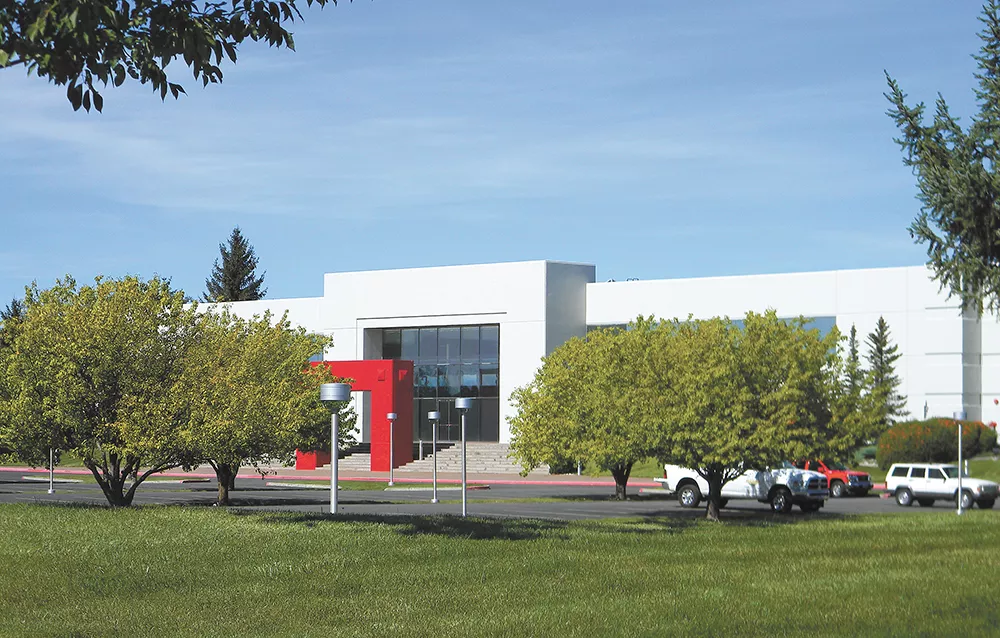
The big, white building on the outskirts of Post Falls has been the center of bad news and good news over the past two years.
In 2014, there was bad news when Kimball International, Inc., a furniture manufacturer, announced that it would move its Post Falls metal fabrication operation from the building to its headquarters in Indiana (where the company was being offered millions in tax breaks), taking more than 200 jobs with it.
Last month, there was good news when Orgill, Inc., a Memphis, Tennessee-based distributor of hardware and home improvement products, announced alongside state officials that they'd reached a deal to bring the company to Kimball's old 475,000-square-foot building.
"It's the base of what I consider to be an economic driver," says Kootenai County Commissioner Dan Green. "The economy is healthy when you bring more businesses here, and that drives everything else."
But the deal strains a fault line in Idaho's conservative politics. The Idaho Freedom Foundation, a conservative political advocacy group that holds sway with state lawmakers, has criticized the state and local officials for twice using what it calls "corporate welfare," millions of dollars in tax breaks and subsidies, to bring each company to Post Falls.
"We won't know if it's effective for years," says Dustin Hurst, communications director for the Idaho Freedom Foundation, which also questions the fairness of using subsidies to lure businesses to the state.
Proponents of the deal with Orgill say it's structured in a way that'll keep the company here for the long term, and that without deals like these, businesses will pass over Idaho.
"The return on investment is pretty darn good," says Gynii Gilliam, president of Jobs Plus, the economic development agency that helped negotiate the deal.
Greg LeRoy — executive director of Good Jobs First, a Washington, D.C., group that monitors corporate subsidies — says that after the South began industrializing following World War II, state governments began competing against each other to attract companies by offering special tax breaks or subsidies.
"Taxpayers can never really know if the tax break made the difference, or if there was something really compelling about the place," says LeRoy. "The way the system is rigged is [companies] can make up their mind, and will stage an auction and pit places against each other."
One incentive commonly offered by states, says LeRoy, is to pay to train a company's workforce. According to a report from the Idaho Department of Labor, the state spent $88.4 million helping companies train their workers between 1996 and 2015.
Among the companies that benefited from this program was Kimball, which in 2007 was awarded nearly $120,000 to train 83 people for positions at its Post Falls campus, according to Carmela Ramirez, a project manager in the department. The program helped lure Kimball to Idaho. But the company would later get a better offer.
When Kimball made the decision to relocate its Post Falls operation to Indiana, it issued a press release stating that the move would optimize its supply chain and manufacturing footprint. At the same time, the Indiana Economic Development Corporation issued a press release touting Kimball's move, and how it had offered the company up to $1 million in conditional tax credits and up to $300,000 in training grants.
"If Idaho wants to get into an arms race with other states, they are going to lose," says Hurst, who calls Idaho's workforce training program a "slush fund for corporate welfare."
Hurst says that a similar situation unfolded in Pocatello, where Heinz Frozen Foods closed in 2014 after receiving a $880,000 workforce training grant. He says the state later gave Amy's Kitchen $8 million in training grants and tax breaks to move to the site.
In 2014, Idaho lawmakers passed legislation that allows the Idaho Department of Commerce to negotiate tax credits of up to 30 percent for up to 15 years with companies. To be eligible, companies have to create 20 new jobs in rural areas, or 50 in urban settings, that are full time and pay wages equal to or greater than the county average.
Opponents of the bill expressed concern that it would promote "crony capitalism" and an unfair tax structure, and it drew an unsuccessful legal challenge after being passed. But according to the program's annual report for fiscal year 2015, it had a return of $4.22 in taxes for every dollar in tax credits. The report also states that the 16 businesses awarded the incentive created 3,000 jobs and generated $131 million in tax revenue last year.
Over the summer, Orgill qualified for a 26 percent tax credit under the program over a 10-year period. Gilliam says that Kootenai County kicked in a five-year tax exemption on equipment, building improvements and other expenses. Under the deal, the company is expected to create 100 jobs at an average wage of $41,200. "I'm personally not worried [that Orgill will leave] because the incentives are paid out over time," says Green, who also notes that the company isn't competing with any local businesses.
But using tax incentives remains contentious in Idaho. Sen. Dan Johnson, R-Lewiston, expressed concerns that the incentive program could negatively impact smaller competing businesses when it was being considered. Now, he says he worries that an amendment lawmakers passed last year loosening the program's requirement that companies pay at or above the county's average annual wage is undermining its original intent.
Hurst says that the state should focus on reforming the tax code so it's favorable for all businesses.
"Think about the little guy who might have a startup who is forming a tool company; he doesn't get a tax break," says Hurst. "If it's good for big business, why not the little business?"♦
